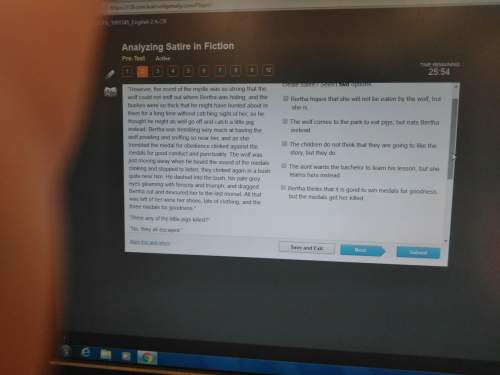
English, 19.02.2021 21:50, Dalmcdan01
Centuries ago, countries sponsored explorers to set sail for parts unknown and return with tales of new lands. These explorations led the Europeans to discover North America. The ocean journey from England, France, or Spain to North America was 3,000 miles of unknown dangers, but it led to discoveries. Explorers made these treacherous voyages for three main reasons: religion, wealth, and competition. These voyages of discovery began in the eleventh century.
Historical records indicate that Leif Eriksson, a Viking explorer, was the first man to reach North America around 1000. Leif is credited with landing along the coastline of present-day Newfoundland. A Viking settlement was established and occupied for several years before Eriksson left to return to his homeland. He died around 1020.
Much later, Christopher Columbus left his homeland in 1492 to seek wealth in the form of trade items. The Italian explorer was destined for China but erred in direction and arrived on Watling's Island in the Bahamas. It was a long and dangerous journey. Upon arrival, Columbus dedicated the newly discovered land to the Spanish King and Queen of Aragon. Then, Columbus made three more voyages to North America in 1493, 1498, and 1502. To the very end, Christopher Columbus was adamant that he discovered a trade route to China. He denied ever being to North America.
Credited with sailing around the southern tip of Florida, Spanish explorer Juan Ponce de Leon had several adventures in the New World. His journey around Florida occurred in 1513. At the time, he thought Florida was an island. When he returned to Florida in 1521, he was wounded by a poisoned arrow, which ultimately ended his life.
Afterward, Hernando De Soto, a Spanish adventurer, left to explore present-day Florida in 1538. He and his men traveled thousands of miles through the South. They were the first Europeans recorded to have crossed the Mississippi River in 1541.
Sir Walter Raleigh was a soldier, a writer, and a friend of the Queen of England. Around 1587, he sent English colonists to a region later called Virginia. The colony is believed to have been located in North Carolina. Since the people arrived together, their previous lifestyle and beliefs were transplanted to the New World.
Finally, Rene Robert de La Salle was French. Historical data credits de La Salle as being the first explorer to traverse the Mississippi to its mouth at the Gulf of Mexico. He claimed the land that bordered the Mississippi River (about a third of present-day United States) for France on April 9, 1682. He built numerous forts along the route, but the settlers were often terrorized by the natives.
These brave explorers from England, France, and Spain have left their legacy. As a result of their adventures, many people now enjoy North America's religious diversity, natural resources, and independence.
What is the overall structure of this text?
Cause and effect
Chronological order
Compare and contrast
Problem and solution

Answers: 3
Other questions on the subject: English

English, 21.06.2019 19:20, ashrobbb
Select the correct answer. in this excerpt from "a modest proposal" by johnathan swift, what does the author list? i can think of no one objection, that will possibly be raised against this proposal, unless it should be urged, that the number of people will be thereby much lessened in the kingdom. this i freely own, and 'twas indeed one principal design in offering it to the world. i desire the reader will observe, that i calculate my remedy for this one individual kingdom of ireland, and for no other that ever was, is, or, i think, ever can be upon earth. therefore let no man talk to me of other expedients: of taxing our absentees at five shillings a pound: of using neither cloaths, nor houshold furniture, except what is of our own growth and manufacture: of utterly rejecting the materials and instruments that promote foreign luxury: of curing the expensiveness of pride, vanity, idleness, and gaming in our women: of introducing a vein of parsimony, prudence and temperance: of learning to love our country, wherein we differ even from laplanders, and the inhabitants of topinamboo: of quitting our animosities and factions, nor acting any longer like the jews, who were murdering one another at the very moment their city was taken: of being a little cautious not to sell our country and consciences for nothing: of teaching landlords to have at least one degree of mercy towards their tenants. lastly, of putting a spirit of honesty, industry, and skill into our shop-keepers, who, if a resolution could now be taken to buy only our native goods, would immediately unite to cheat and exact upon us in the price, the measure, and the goodness, nor could ever yet be brought to make one fair proposal of just dealing, though often and earnestly invited to it. a. reforms that had failed to improve ireland's situation b. the unrealistic measures discussed by irish government officials c. viable measures that could improve ireland's situation d. measures that would unify the populace of ireland
Answers: 1

English, 21.06.2019 23:00, DeeThinker226
What theme of antigone do the above events reflects
Answers: 3

English, 22.06.2019 02:30, gwendallinesikes
Andy bernard laughed at my joke, spitting out his water. complete thought incomplete thought
Answers: 1
Do you know the correct answer?
Centuries ago, countries sponsored explorers to set sail for parts unknown and return with tales of...
Questions in other subjects:

Mathematics, 14.06.2021 18:40

English, 14.06.2021 18:40



Mathematics, 14.06.2021 18:40


Mathematics, 14.06.2021 18:40


Mathematics, 14.06.2021 18:40

Mathematics, 14.06.2021 18:40







